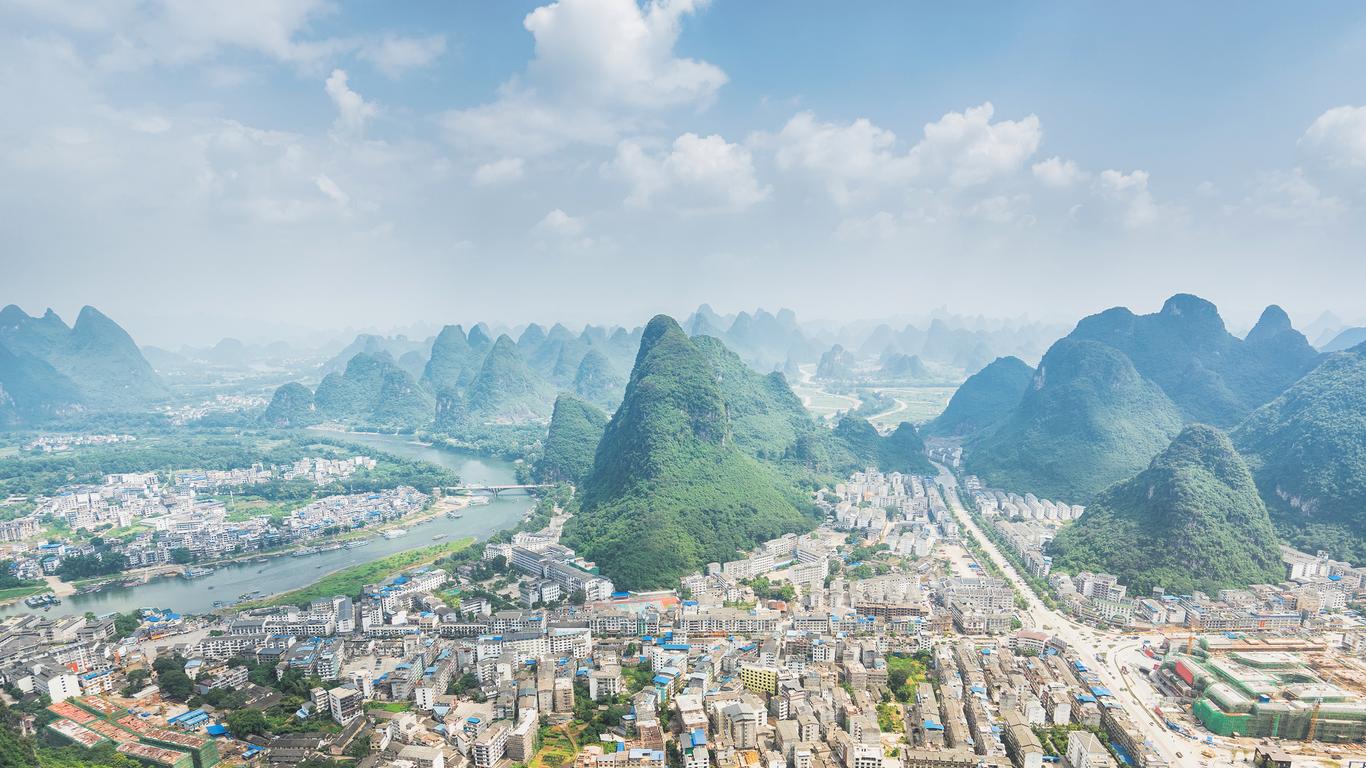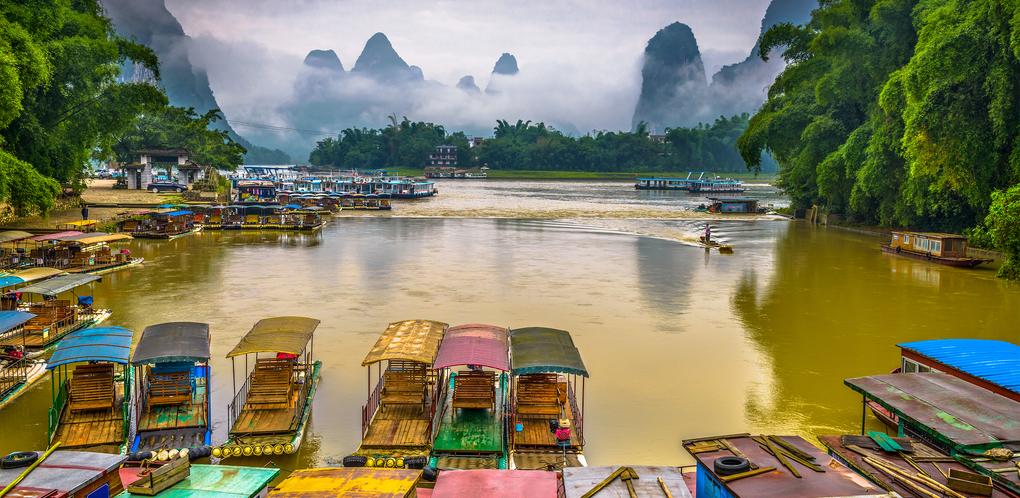
Guilin travel guide
Guilin Tourism | Guilin Guide
You're Going to Love Guilin
Guilin is one of the biggest tourist destinations in China due to its many lakes, rivers and lush green scenery. This area is well equipped for visitors, with many upscale hotels and tour excursions available.

Top 5 Reasons to Visit Guilin
1. Li River Cruise
Take a bamboo raft across the Li River for views of sprawling rice paddy fields and the imposing Karst Mountains. Tickets cost CNY360.
2. Jingjiang Prince City
This small forbidden city used to be the home of Chinese princes, and now functions as a museum for tourists.
3. Guilin Shangri-la Park
This ethnic theme park hopes to educate visitors about the local cultures of the Guangxi Province, with handcraft displays and performances.
4. Reed Flute Cave
These limestone caves provide tours around various artificially lit stone formations which resemble figures such as lions, monkeys and the skyline of Guilin.
5. Xiongsen Bear and Tiger Mountain Village
Tigers, lions and bears ornament this wild animal park which specializes in research and tourist entertainment.
What to do in Guilin
1. A Karst Of Hundreds Of Stunning Sights
Guilin wouldn't be half the attraction it is without the dramatic karst scenery that dominates its hinterland. If it's views you're after, taking a cruise down the Lijiang (or Li) River should be at the top of your list. Cruises leave Guilin every day, and pass serenely by rustic villages, water buffalo, rice paddies, and innumerable fishing craft seeking to exploit the rich river harvest. You'll pass ancient towns like Daxu and natural features like Crown Cave, but the star of the show is the backdrop. All along the way, karst hills rise in angles and shapes that disorient and amaze. There's no place quite like it.
2. Elephant-Astic Photo Opportunities
Probably Guilin's iconic attraction, Elephant Trunk Hill can be found right next to the Lijiang River. In fact, as the name suggests, this limestone outcrop looks uncannily like an elephant dipping its trunk into the Lijiang for a refreshing draught of water. After you've taken the obligatory snaps of the elephant, it's well worth exploring the surrounding Xiangshan area, too, with fine views from the top of the hill. You can also pass through Water Moon Cave beneath the pachyderm's trunk with the help of enterprising local boatmen.
3. Walk Back A Thousand Years
One of the jewels of the countryside around Guilin, Jiāngtóuzhōu is a village that dates back 1,000 years (or more). Situated around 20 miles north of the city itself, Jiāngtóuzhōu is full of atmospheric alleyways, centuries-old homes than haven't changed much since the Ming dynasty ended, and some fine places to grab a healthy tofu-centered lunch. Look out for the decorations of the village, too, which have a charming floral theme, and take some time to simply wander. It's a great place to lose yourself for a couple of hours.
4. An Illuminating Experience
These twin pagodas are hard to miss in central Guilin, having been built around the town's central Shanhu lake. Constructed around octagon-shaped floor plans, and rising an impressive seven stories, the two pagodas are linked together by an unusual underwater tunnel. The Sun Pagoda is probably the highlight, and not just because it has a handy elevator. It's also the world's largest all-bronze pagoda. Both are filled with beautiful Buddhist art works, and both look sublime in the evening when the illuminations kick in.
5. Gateway To Historical Adventures
Seeing Nan Men (or "the South Gate") is an absolute essential for history fans, as it's one of the only direct remnants of Guilin's Tang dynasty heyday. Constructed between 600 and 900 AD (and tastefully restored in modern times), it once formed a crucial part of the city's imposing walls. These days, it's quite a sight in the evening when fully lit-up, and you can pass through the portal, reliving the experience of ancient visitors to one of China's greatest cities.
1. A Karst Of Hundreds Of Stunning Sights
Guilin wouldn't be half the attraction it is without the dramatic karst scenery that dominates its hinterland. If it's views you're after, taking a cruise down the Lijiang (or Li) River should be at the top of your list. Cruises leave Guilin every day, and pass serenely by rustic villages, water buffalo, rice paddies, and innumerable fishing craft seeking to exploit the rich river harvest. You'll pass ancient towns like Daxu and natural features like Crown Cave, but the star of the show is the backdrop. All along the way, karst hills rise in angles and shapes that disorient and amaze. There's no place quite like it.
2. Elephant-Astic Photo Opportunities
Probably Guilin's iconic attraction, Elephant Trunk Hill can be found right next to the Lijiang River. In fact, as the name suggests, this limestone outcrop looks uncannily like an elephant dipping its trunk into the Lijiang for a refreshing draught of water. After you've taken the obligatory snaps of the elephant, it's well worth exploring the surrounding Xiangshan area, too, with fine views from the top of the hill. You can also pass through Water Moon Cave beneath the pachyderm's trunk with the help of enterprising local boatmen.
3. Walk Back A Thousand Years
One of the jewels of the countryside around Guilin, Jiāngtóuzhōu is a village that dates back 1,000 years (or more). Situated around 20 miles north of the city itself, Jiāngtóuzhōu is full of atmospheric alleyways, centuries-old homes than haven't changed much since the Ming dynasty ended, and some fine places to grab a healthy tofu-centered lunch. Look out for the decorations of the village, too, which have a charming floral theme, and take some time to simply wander. It's a great place to lose yourself for a couple of hours.
4. An Illuminating Experience
These twin pagodas are hard to miss in central Guilin, having been built around the town's central Shanhu lake. Constructed around octagon-shaped floor plans, and rising an impressive seven stories, the two pagodas are linked together by an unusual underwater tunnel. The Sun Pagoda is probably the highlight, and not just because it has a handy elevator. It's also the world's largest all-bronze pagoda. Both are filled with beautiful Buddhist art works, and both look sublime in the evening when the illuminations kick in.
5. Gateway To Historical Adventures
Seeing Nan Men (or "the South Gate") is an absolute essential for history fans, as it's one of the only direct remnants of Guilin's Tang dynasty heyday. Constructed between 600 and 900 AD (and tastefully restored in modern times), it once formed a crucial part of the city's imposing walls. These days, it's quite a sight in the evening when fully lit-up, and you can pass through the portal, reliving the experience of ancient visitors to one of China's greatest cities.
Where to Eat in Guilin
NengRen Shan SuShi Restaurant serves traditional food at great prices near Guihu Lake. Buffet prices start at CNY26.
When to visit Guilin
The best time to visit is in the spring or autumn seasons, or at least outside of the rainy season so that there are more outdoor activities available.
How to Get to Guilin
Plane
The Guilin Liangjiang International Airport is 28km outside of the city in nearby Liangjiang. Tickets from London cost roughly CNY4,000 one way.
Train
Guilin Train Station connects to other cities in China. The trip from Shenzhen takes 3 hours and costs roughly CNY212.
Car
Driving to Guilin from Shenzhen (the border to Hong Kong), you can take the G4, S15 and S55 highways. The trip takes 5 hours one way.
Bus
The Guilin Bus Station has many connections to bigger cities such as Shanghai and Beijing. Overnight sleeper buses cost between CNY100-CNY250.
Airlines serving Guilin
Where to stay in Guilin
Yangshou - This nearby city has an idyllic landscape complete with bamboo river tours, walks through rice paddy fields and mountain hiking.
Popular Neighborhoods in Guilin
Central Square - The heart of downtown, this neighborhood has the highest concentration of bars, hotels and shopping opportunities.
Daxu Town - This small ancient town features many temples, bridges and tombs as well as a strip of quaint historic buildings along Bluestone St.
Where to stay in popular areas of Guilin
Most booked hotels in Guilin
How to Get Around Guilin
Public Transportation
There are many buses servicing Guilin city. One way tickets cost CNY2, however the #5 buses within downtown are all free.
Taxi
Taxis in Guilin generally come at a fixed price of between CNY25-CNY30 for a ride in the city center.
Car
Most car rentals come with an experienced driver to shuttle you around the region. Prices start at CNY950 a day for a 7-seat bus.
The Cost of Living in Guilin
Shopping Streets
The underground market near the train station is a great place to pick up food, bags and electronics.
Groceries and Other
The two main grocery stores are Guilin Reqing Food Shop and Guilin Xiangshan Great Wall Food Business Department. A dozen eggs costs roughly CNY12.
